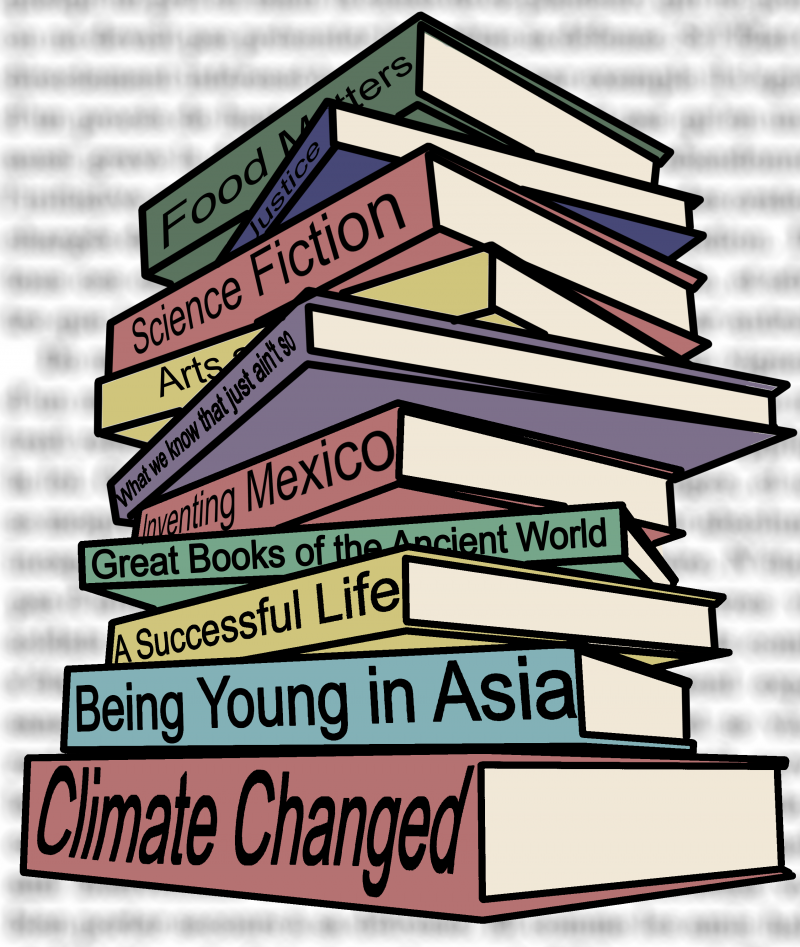“Alien.” Steve Jobs. “Ex Machina.” The “Mona Lisa.” Sigmund Freud. What do these things have in common? They were all part of the curriculum of one of Trinity’s First-Year Experience courses this past semester.
The First-Year Experience, or FYE, is a rite of passage at Trinity: every incoming first-year must sign up for one of 11 topics, ranging from Being Young in Asia to Food Matters and everything in between. The courses are designed to help students attain college-level critical thinking and writing skills in a small, seminar-type environment.
Thomas Kasierski, a first-year in the Arts and Ideas course, thinks that his FYE has helped him gain the skills he’ll need to be successful in college.
“My biggest lessons from the class were about time management and continuous revision of my papers. That’ll be invaluable as I go through Trinity,” Kasierski wrote in an email interview.
Kasierski’s favorite aspect of the course, though, was being able to exercise his creativity through writing.
“I really enjoyed the papers we did for writing workshop. Since art is a pretty broad subject, we could basically write about whatever we wanted. For instance, my three papers were on Twenty One Pilots, Children of Men and Apple advertisements. Each one legitimately interested me and I got to explore them in a really unique way via philosophy,” Kasierski wrote.
Gavin Buchanan, a first-year in the Science Fiction FYE, agrees that the course helped him build valuable skills, though not necessarily skills helpful for his major.
“I’m doing mathematical finance, which is very far away from what I’ve been doing in my Science Fiction FYE, but I think [my FYE] has really expanded my ability to dig in to texts that I’m reading, and improved my ability to analyze movies, so it might be more of a personal life thing, but I’m really glad that I took SciFi because now I’m able to analyze things on a deeper level,” Buchanan said.
Both Buchanan and Kasierski commented on the amount of work that their FYE required. Kasierski cited the heavy workload as his main complaint about the class.
“The workload was insane! There was one week where I had three papers due over the course of three days just in my FYE. I made it through, but it added a ton of stress to my life that was hard to handle as a first-year student just getting my feet on the ground,” Kasierski said.
Buchanan echoed Kasierski’s sentiment about the magnitude of the workload, but he characterized it as another aspect of the course that will help him throughout college.
“Because it was such a big workload, much more than any of the other classes I took this semester, and it gave more of a rigid schedule, I think that in semesters ahead, with classes that are more challenging, [my FYE] will give me a better ability to tackle that,” Buchanan said.
First-year students aren’t the only students in the classroom during their FYE, however. Each individual FYE section has two peer tutors. These peer tutors are upperclassmen assigned to each section to help guide the first-years through their assignments, and serve as a bridge between the professor and the students.
Sophomore Kirsten Timco, a peer tutor for the Climate Change FYE, emphasized how much respect she has gained for professors as a result of being a peer tutor and having to grade papers.
“Grading papers is tough. I really appreciate professors who grade attentively and efficiently now that I know how long it takes to grade even just 15 papers,” Timco wrote in an email interview. “I did only a fraction of the work [that professors do], and it was a lot to handle, so I can only imagine how wonderful and dedicated our professors have to be to do this full time.”
Timco also said that another unexpected challenge has been the lack of initiative from the students in her section.
“It was very frustrating when I had scheduled open office hours for two or three hours, and no one [showed] up,” Timco wrote. “I didn’t really understand their lack of initiative sometimes, but then remembered how tough first semester of first year is. It takes time to learn, and I know they’ll get there.”
In general, though, the experience has been positive for Timco.
“The overall experience was more relaxed than I thought, which was a relief. The students were more relaxed than in my HUMA class, so I think the professors and I got really lucky with our students. I was surprised by their readiness to contribute and receptiveness to my advice,” Timco wrote.
Katie Welch, a peer tutor for the Creative Genius FYE, also had a positive experience this past semester.
“I’ve really enjoyed getting to know the first-years and also seeing what the class experience is like from professors’ perspectives. I think I’ll be a little sad when the class is over, because I’ve loved getting to know to everyone in the class,” Welch wrote in an email interview.
All of the students, both first-years and peer tutors, recognized the positive impact that the FYE had on their college life. Buchanan even said that he is interested in being a peer tutor next fall, to continue the cycle and help the new class gain the skills they’ll need for the next four years and beyond.







